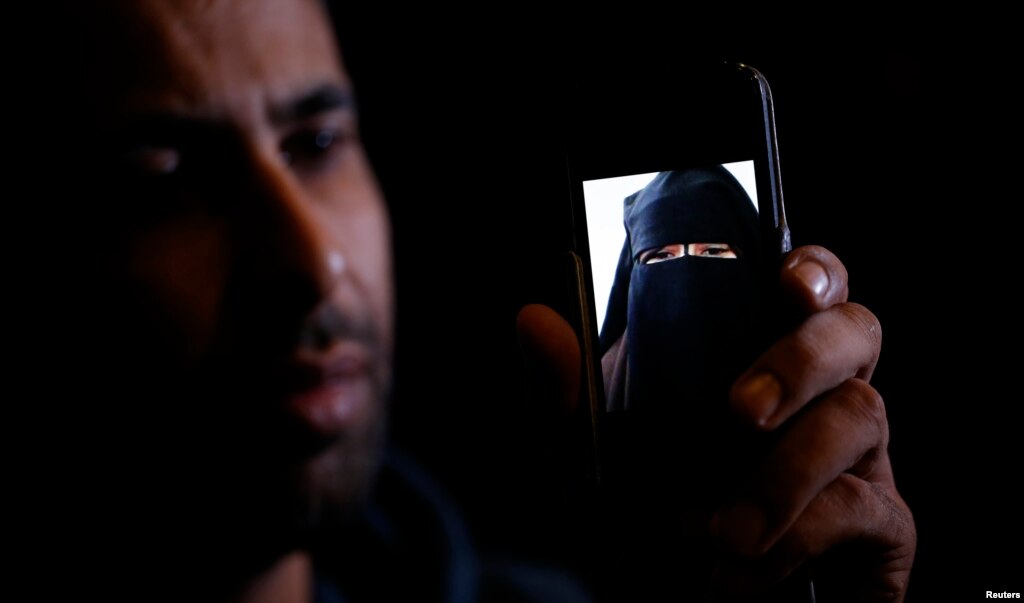
Hundreds of young Europeans and others have joined jihadist groups in the Middle East. Experts estimate that up to 10 percent of the new members are women. These women are reacting to the lure, or appeal, of a pure Islamic state. And they seem to like the idea of fighting in combat for the jihadists.
Assia Saidi recently disappeared from her home in southern France. On her Facebook page, she wrote she had gone to join the Jihad in Syria. Investigators and her family launched a widespread search. They found the 15-year-old-girl working in Marseille at a bar – where people are served food and alcoholic drinks.
Assia Saidi told French radio that she became interested in the jihadi movement after reading stories on the World Wide Web. But in Marseille, people told her that the individuals who wanted to her to join were terrorists.
Other stories about women and the jihadists do not end so happily.
Hundreds of girls and young women are leaving Western nations to join the Islamic State and other radical groups. It is hard to say how many join, but France appears to be a leading exporter of such women. Almost 1,000 Jihadi fighters came from France. More than 60 of them were women.
Katherine Brown is a lecturer with the Defense Studies Department at King’s College London. She has been studying the role of women in jihadi movements.
“This idea of radicalization is very, very popular at the moment. But actually our understanding is very limited. Because what has become really, really clear is that individual motives are very, very diverse.”
Ms. Brown has looked at social media to find out why Western women are interested in joining the Jihadis.
“Women join radical groups and travel to Islamic states both for personal and political reasons…I really resist this idea of saying it’s all about emotion, it’s all about finding a husband, it’s all impulsive or irrational.”
She says some women do want to become “Jihadi brides” – someone who marries a Jihadist fighter. But others like the idea of a Muslim nation, such as one described by the self-described Islamic State – even when Islamic State methods are clearly brutal.
Dounia Bouzar heads a new Paris center to prevent people from becoming radicals. She says men are interested in arguments like fighting evil. Recruiters use humanitarian arguments to lure women.
Ms. Bouzar says the recruiters’ first method is getting women to believe they must die in the Holy Land to save those they love. She said a second way is to tell them they must do good work there. She says that interests lots of women who want to become doctors, health care or social workers.
But Islamist expert Louis Caprioli says the Islamic State also is sending a more activist message. He is a former top anti-terrorism official.
Mr. Caprioli says the Islamic State supports women in the Jihad, so it is not just going out to do social work. But he says it is urging them to really take an active part. He says videos show women using strong language, threatening to kill people and holding guns.
Katherine Brown says these images have a strong effect even if few women really fight.
“…and the reason it’s significant is because of our biases. Because it is powerful in our society to see women engaging in acts of violence. So it’s quite a propaganda coup.”
I’m Bob Doughty.
*This report was based on a story from reporter Lisa Bryant in Paris. Jeri Watson wrote the story for VOA Learning English. George Grow was the editor.
Words in this Story
lure - v. to tempt a person or animal to do something or go somewhere, especially by offering some kind of reward
lure - n. something that tempts or is used to influence a person or animal to do something
combat - n. fighting between armed forces
radical - adj. supporting or based on complete political or social reform; representing or supporting extreme members of a political party
radical – n. a person who supports thorough or complete political or social reform
emotion - n. a state of feeling
impulsive – adj. doing things suddenly and without careful thought
irrational – adj. unreasonable, not sensible
brutal – adj. extremely cruel or harsh
anthropologist – n. one who studies the science of human beings
recruiter – n. a person who seeks out individuals for employment
Now it’s your turn to use these Words in this Story. In the comments section, write a sentence using one of these words and we will provide feedback on your use of vocabulary and grammar.

